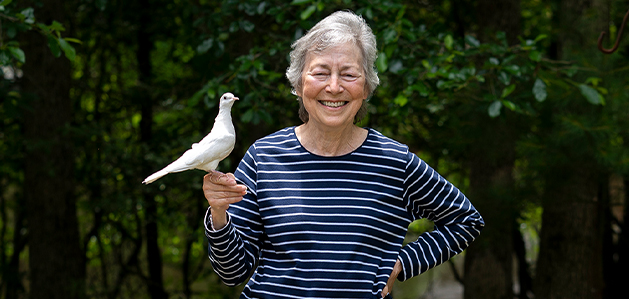3 Changes You Can Make Today to Lower Your Cancer Risk
The American Cancer Society released new guidelines for how changes in your diet and physical activity can significantly lower your risk for cancer. Start today with these tips.
By Lori Timmerman, DO, Breast Surgeon—Virtua Breast Care – Voorhees
In 2020, the American Cancer Society released guidelines for how, in addition to not smoking, changes in your diet and physical activity can significantly lower your risk for cancer. The guidelines note that at least 18 percent of all cancer cases in the U.S. are related to a combination of these controllable lifestyle factors:
- Maintaining a healthy weight
- Eating healthy, nutritious food
- Staying physically active
- Abstaining from drinking alcohol or drinking less
While making a few lifestyle changes seems simple enough, it’s not. It takes consistent work to make changes, and that’s hard. Breaking up these changes into smaller goals makes it easier to lower your cancer risk and live a healthier life.
Maintaining a healthy weight is tied directly to eating nutritious foods and staying active. This is important because being overweight or obese is linked to an increased risk for various cancers, including breast, colon and rectal, gynecologic, gastrointestinal, and others.
The connection between weight and cancer risk is actively studied and complex. However, researchers think it’s tied to hormones like estrogen and insulin, the immune system, inflammation, and even how you carry fat on your body.
What’s most important is taking steps to eat healthier foods, stay active, and reduce your alcohol intake. Here are some simple things you can do today to reduce your cancer risk.
Eat healthy, nutritious foods
Some key factors driving weight gain in the U.S. are sugar-sweetened drinks and fast or processed foods that are high in fat and sugar. To combat this, we suggest you start small and make healthier choices every day:
- Eat the rainbow: choose fruits and veggies from each color group like red peppers, oranges, yellow squash, leafy greens, blueberries, and eggplant.
- Make half your grains whole grains: choose whole-grain bread and pasta, brown rice, quinoa, and oatmeal.
- Limit or avoid eating red meat and processed meats: reduce beef, pork, and sausage in your diet, and replace them with lean poultry or fish. Or, take a more plant-based approach, replacing meats with beans, jackfruit, tofu, tempeh, or seitan.
- Replace sugar-sweetened beverages: drink water or water with fresh fruit, flavored seltzer, or unsweetened tea.
- Leave room in your daily diet for a small indulgence: if chocolate is your favorite treat, savor a piece of dark chocolate after dinner. If you’re a salty snacker, treat yourself to a pre-portioned bag of popcorn or pretzels.
- Get help if you need it: a registered dietitian can help you develop a healthy eating plan that works for you and includes your favorite foods.
Get or stay physically active
Along with eating healthy foods, physical activity helps lower the risks of being overweight or obese. The overall goal is to sit less and move more. If you haven’t exercised, you should check with your doctor before jumping into a more vigorous exercise program.
The easiest of all activities is walking—you just lace up your sneakers and take the first step. Setting small, achievable goals helps—maybe you can set a goal to walk to the end of the block and back and then add another block on your next walk.
The American Cancer Society recommends that adults get 150 to 300 minutes of moderate-intensity exercise per week, choosing an activity that works for you. This includes:
- Exercise: walking, dancing, biking, yoga
- Sports: golf, softball, baseball, doubles tennis
- Around the house: mowing the lawn, yard work
You also can engage in 75 to 150 minutes of vigorous-intensity activities, including:
- Exercise: jogging/running, aerobics, weight training, kickboxing, swimming
- Sports: soccer, basketball, racquetball, singles tennis
- Around the house: digging, masonry, carpentry
Abstain from drinking alcohol or drink less
There’s a link between alcohol consumption and cancer, as it increases your risk for cancers of the mouth, throat, breast, esophagus, liver, colon, and rectum. In addition, it adds empty calories to your diet that can lead to weight gain.
The American Cancer Society recommends NOT drinking alcohol. However, if you drink alcohol, it’s best to do it in moderation. That means no more than one drink a day for women and two for men.
A “drink” is defined as:
- 12 ounces of beer
- 5 ounces of wine
- 1 ½ ounces of 80-proof distilled spirits (vodka, rum, bourbon, tequila)
Your cancer risk is linked to the amount of alcohol you drink, not the type. Therefore, it’s not advised to consume more alcohol on fewer days.
And, one more thing
In addition to these recommendations, cancer screenings increase the chance of detecting certain cancers early, when they might be easier to treat. Learn what screening tests the American Cancer Society recommends, when you should have them, and what’s covered under some types of insurance.
Your doctor is your best resource for helping you make the lifestyle changes necessary to reduce your cancer risk.
Schedule an appointment online with a Virtua Primary Care provider for assistance.
There's So Much More to Explore
Discover expert insights, inspiring stories, health tips, and more by exploring the content below!

10 Reasons To Schedule Your Colonoscopy Today
Is an At-Home Colon Cancer Test a Good Alternative to a Colonoscopy?

The HPV Vaccine: A Powerful Shield Against Cervical Cancer

How Does Breast Density Affect Your Mammogram?

Breast Cancer Diagnosis Inspires Catherine to Help Others

Put Your Mammogram Appointment on the Top of Your To-Do List
Firefighter's Successful Lung Cancer Care at Virtua

A Breast Self-Exam Saved Kristen's Life

Protect Your Child From HPV and Related Cancers

What to Know About Cervical Cancer Screenings
6 Tips for an Easier Colonoscopy Prep

Rectal Cancer Surgery Gets Eileen Back to her Magical Life | Virtua Health
Robotic Surgery Helps Shelly Haney Return to Her Happy Place

